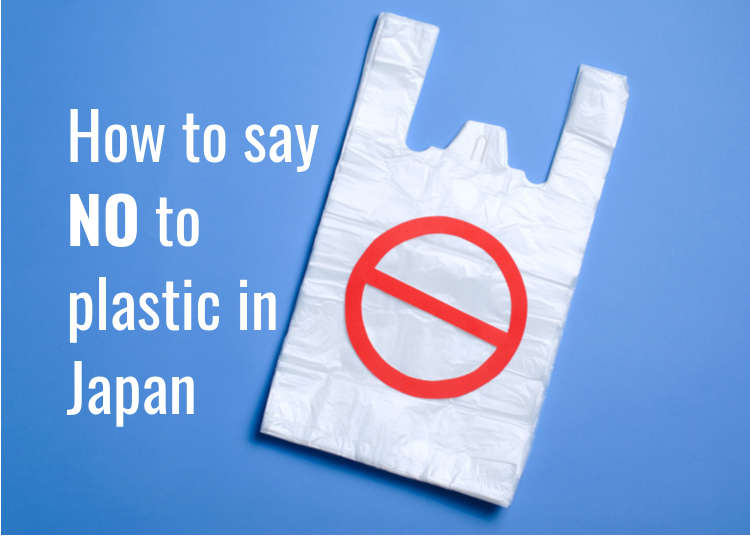
Over-wrapped! How To Limit Plastic Waste While In Japan
- Written by: Lucio Maurizi
For newcomers to Japan, one of the biggest surprises may be the sheer amount of unnecessary packaging – particularly with plastics. While some Japanese retailers have recently taken proactive steps to encourage consumers to use eco-friendly reusable bags, these approaches have not yet been more widely adopted or imposed by the government.
However, as the Tokyo 2020 Olympics approach, eco-conscious discussions have to some extent been reignited, with Environment Minister Yoshiaki Harada saying at a press conference in June 2019 that his ministry plans to introduce legislation curtailing the use of single-use plastic bags that are currently offered for free. Despite this positive step, Japan continues to be one of the largest producers of plastic waste per capita in the world.
So if during your trip to Japan you find yourself being bombarded with excess packaging, here are some key phrases and tips on how you can cope!
Background: Why is Japan infatuated with plastic and packaging?
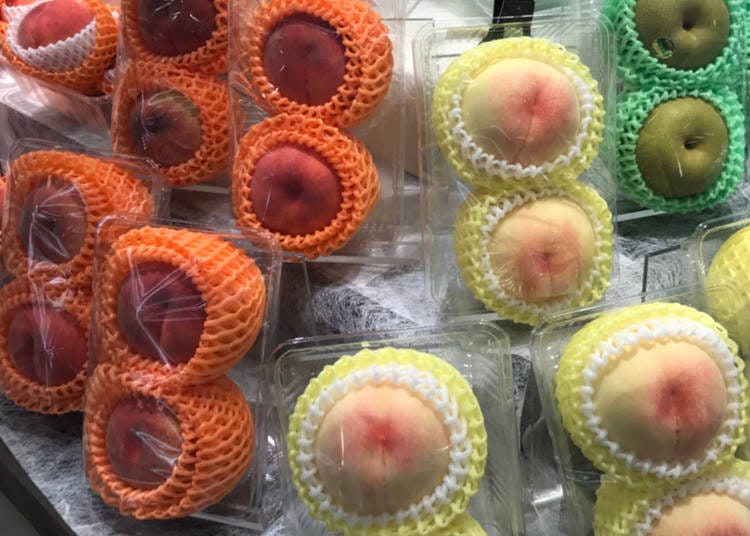
The simple answer is that Japan is a very detail-oriented society that values quality, presentation, and customer satisfaction. One of the results of this is that attention to packaging is paramount. To stores and their staff, wrapping the product with a good package shows the care they have for the customer. A well-wrapped item will not only be beautiful and well-presented, but there is a practical aspect: it will also be protected and in pristine condition.
To achieve these levels, though, a relatively large amount of packaging material is needed. Similarly, in order to guarantee a comfortable transport of your purchase (or for convenience when you purchase multiple items as gifts), you'll often be given or offered multiple bags.
Of course, all of us like comfort, and no one would complain about amazing customer service and care, but, if you're environment-conscious and want to be able to do your part and avoid waste while visiting Japan, it will help to know what to expect from Japanese stores, and how to ask to avoid unnecessary usage of plastic and paper.
Saying NO to unnecessary packaging: General phrase for all situations

Regardless of the store you visit, once they are about to hand you a bag, or pack your purchase you can say "Iranai desu (I don't need it)," referring to both bagging and wrapping (or either one of them).
To make things even easier for yourself, there is also a common gesture that means "no" or "I don't need it." Make an X with your arms (or open hands if you want the gesture to look softer) and you'll be all set.
Now that you know the basics, let's take a look at some specific situations you're likely to find yourself in and what phrases can be used.
Saying NO to unnecessary plastic: At Convenience Stores
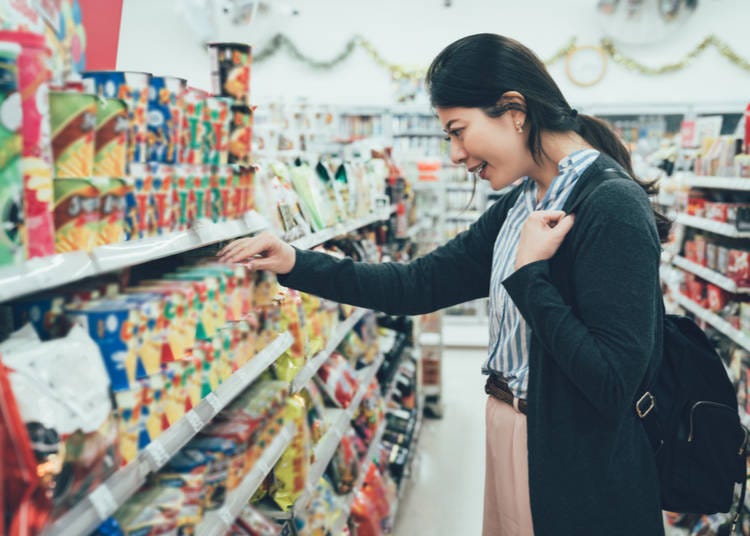
Convenience stores are something of a godsend for many foreign tourists, as they offer practically all of the basic necessities, from snacks and prepared meals to things like SD cards and power banks. And for the most part they are open 24/7 and happy to serve. Their service also shines in the way they treat patrons. The attitude of the staff will always be polite and helpful, and they will make sure you have enough bags for whatever you need, or don't need, or didn't even think you may have wanted.
Common situations and polite ways to address them
1. Staff will usually pack items in several bags, even when one slightly larger one would do the trick. Before they start packing, you can ask: "Hitotsu no fukuro ni matomette moraemasuka (Could you please put everything in one bag?).” They will surely oblige.
2. When buying food, such as a bento lunch box or prepared pasta, you’ll likely be given plastic cutlery or chopsticks – or sometimes both.
Useful approach: If you're planning on eating in your hotel room, you're probably not going to need cutlery anyway. Depending on your circumstances, you might want the cutlery and/or chopsticks, but not the bag – or you might want only the meal.
If you do need some cutlery, chances are you won't need as many items as they are going to give you.
In this case you could say:
"_____ iranai desu."
・Hashi = chopsticks
・Fo-ku = fork
・Naifu = knife
・Spoon = spoon
・Fukuro = bag
If you just want your purchase and don't need a bag or any cutlery, you could say: "Sono mama de kudasai (As it is, please).”
3. Furthermore, should you buy drinks, along with cold and hot food, you'll likely be asked if you want these items to be bagged separately: "Fukuro owake shimasuka?"
Should you not want the items to be bagged separately, you could respond with: "Issho de daijoubu desu (Everything together is ok).”
Saying NO to unnecessary plastic: At Cafes
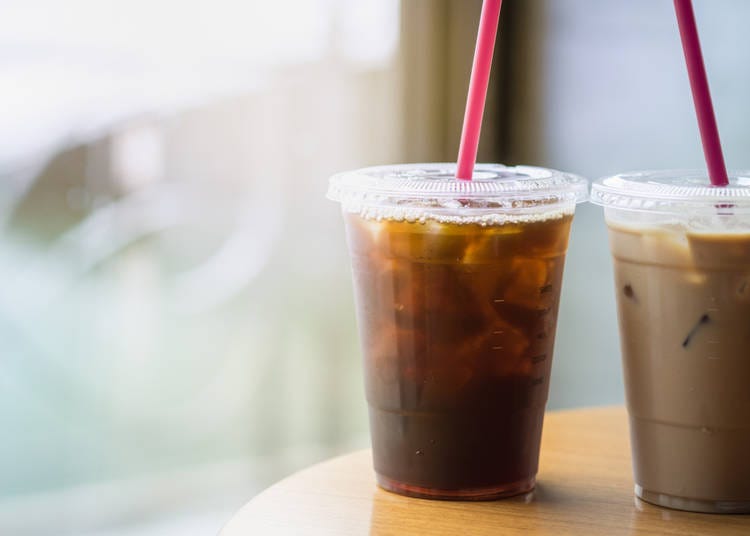
In convenience stores you can get coffee and other drinks, but often these will also come with plastic. Meanwhile, at cafes you can often get drinks in a mug. Even if a paper or plastic cup is offered instead, a plastic straw, plastic muddler, and things like single-serving creamer and sugar will be automatically placed on your tray – or included in a takeout bag.
Common situations and polite ways to address them
When visiting a café drinks are often served in paper or plastic cups. Depending on the café, though, if you're planning on sitting and enjoying your drink within the café, they will give you the same beverage in a glass, or ceramic mug.
When you order, tell them: "Koko de nomimasu (I'll drink here)." or "Mug cup de dekimasu ka? (Can you put this in a mug please?)"
Sometimes, though, the drink (especially coffee) will come in a plastic cup and a straw, or a paper cup no matter what. There's really no way around it, but you can use our magic formula "iranai desu" for anything we don't need (straw, or muddler).
Saying NO to unnecessary plastic: At souvenir shops
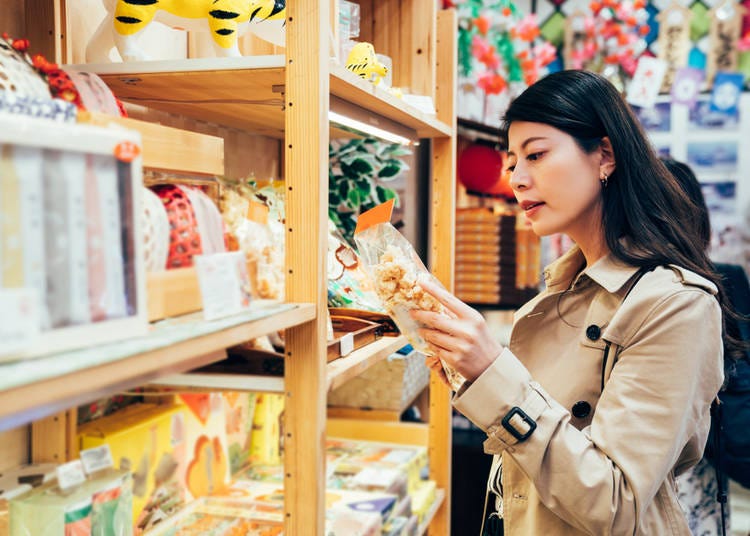
You'll most likely end up in small or big souvenir shops looking for mementos for yourself and presents for your friends and family back home.
Sometimes you'll opt for traditional items, other times for local food-stuff and sweets. Regardless, these stores will often bag each item you buy in a separate bag, not to mention that they will overly wrap with paper an already wrapped item to improve its presentation.
How to avoid waste and be polite in the process
You may not need 6 bags for six items (maybe you won't need bags at all if you have your own).
In these cases, you can once again say: "Sono mama de daijoubu desu" or "Sono mama ii desu" (It’s ok as it is). Or the ever-present "iranai desu (I don't need it)."
Saying NO to unnecessary packaging: At stationery shops
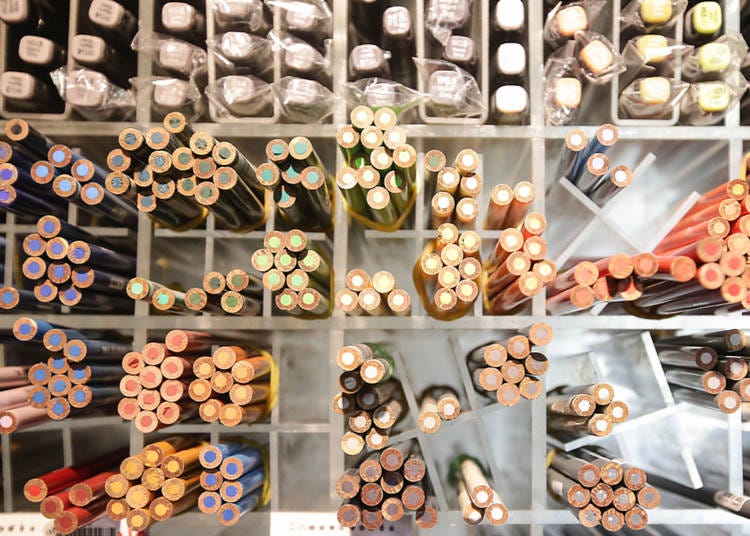
Stationery shops in Japan can be an attraction in their own right. Amazing brushes, pencils, pens, stickers or all kinds, not to mention notebooks, parchments or traditional Japanese paper virtually non-existent outside of the country. You would love visiting a nice stationery shop and chances are you're going to buy something functional – and adorable!
Phrases to kindly let the clerk know you won't be needing too much packaging
In these stores they also wrap everything many times over. Small items like pencils, erasers, markers are individually bagged and then placed in yet another bag along the other items.
However, these items can be easily stored in your purse, or whatever other bag you're carrying - and not require an excess of new bags. To avoid too much waste, you can refer to some of the phrases we used before: "Sono mama de daijoubu desu" or "Sono mama ii desu" (It’s ok as it is). Or the ever-present "iranai desu (I don't need it)."
When customers choose not to use bags after paying, the staff will mark each un-bagged item with a sticker, saving you from carrying a number of bags around (and helping you do your part for the environment in the process).
Saying NO to unnecessary plastic: On rainy days
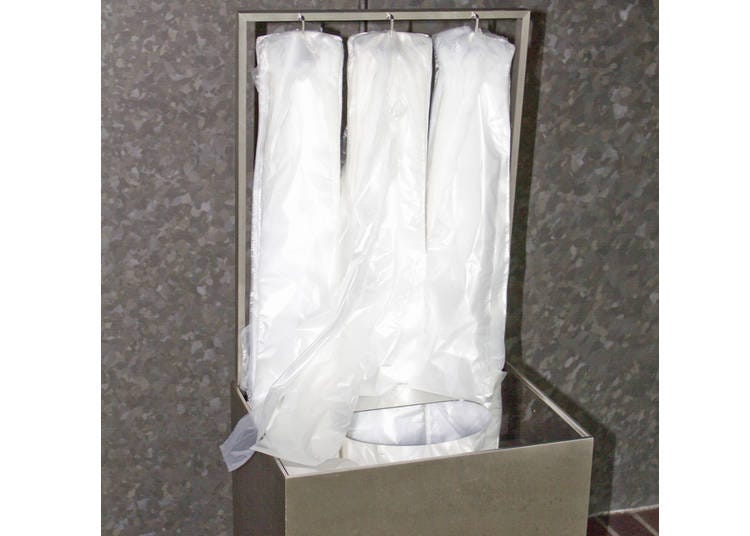
Japan is big on trying to avoid anything that could bother people. Among these things, there's also the issue of wet dripping umbrellas in stores. We can all agree that walking on a wet indoor floor can be annoying, and even dangerous.
One of the solutions many stores adopt is that of offering plastic bags meant to wrap the head of your umbrella so not to have it drip inside.
1. There's usually a waste receptacle for the used plastic covers. While Japanese typically do not re-use them, you can choose to do so - and in most likely others would be none the wiser.
2. The very same stores tend to have umbrella racks right by the entrance. Some of them are even equipped with locks. (Umbrella theft in Japan is surprisingly high.)
3. Alternatively, you can bring your own reusable cover (most umbrellas come with it).
Items to consider packing for Japan

As alluded to above, there are certain preventative measures you can pack for or purchase once in Japan.
1. Portable umbrella with cover; poncho
And especially during rainy season, these can help make your trip so much more comfortable.
2. Eco-bag, day pack, backpack
You can simply place your purchases in these and make them much easier to carry around than bundles of plastic bags!
3. Reusable chopsticks
Not only do they make fantastic souvenirs, but if you have your own set of chopsticks for when you're on the go, you won't need to rely on disposable chopsticks when getting food at a convenience store or takeout.
4. Water bottle
Japan does not have public water taps in as many locations as in other countries, however you can fill up a water bottle at your hotel and bring it around with you, instead of relying on vending machines and plastic bottles at stores.
5. Get a furoshiki wrap
Furoshiki are traditional Japanese wrapping cloths that come in a plethora of different sizes, colors and designs. You can wrap souvenirs and other purchases in these and make them part of a gift to friends and family.
And here you have it. Following these few tips, you will still be able to enjoy the amazing attention to detail and to customers that Japan offers, but you won't have to feel like you're not doing your part for our planet.
Lucio Maurizi is an automotive expert specializing in Japan's car scene and auto-tourism. With an MA in East Asian History from La Sapienza Università di Roma, he's a multi-talented contributor to travel platforms like LIVE JAPAN, Japan Travel, and GPlus Media. His Instagram account (50k+ followers) offers insider views on Japan's automotive culture. Lucio also actively collaborates with professional drivers and influencers and organizes can't-miss car events in Tokyo.
*Prices and options mentioned are subject to change.
*Unless stated otherwise, all prices include tax.
Popular Tours & Activitiess
Recommended places for you
-

A New Tokyo Landmark Is Coming in 2026, and It's Built for Modern Travelers
by: Guest Contributor
-
Ad

Starting at Naha Airport: How to Explore Okinawa Main Island's Tropical Highlights
-
Ad

The Whisper of a 1,300-Year-Old History: Meet the Other Face of Nara at Night
by: Shingo Teraoka
-
Ad

The Latest Guide to "Tourism Mobility": Traveling Japan More Freely. What exactly are Japan’s version of ride-sharing and transit deserts?
-
Ad

Visiting Miyakojima by Cruise: How to Get Around and Enjoy the Famous 'Miyako Blue'
-

Planning Your First Ski Trip to Japan? Here's Everything You Need to Know
by: Marco Blasco
Inspiration for Accommodations
-

Enjoy Mt. Fuji from the Comfort of Your Room! Recommended Ryokan with Mt. Fuji View
-

Stay Near the Cherry Blossoms! Hotels for Cherry Blossom Viewing in Tokyo
-

Family-Friendly Hotels with Free Shuttle to Disneyland: Convenient Access for a Magical Stay
-

Top Ranked Hakone Hotels with Mt. Fuji View: Enjoy Stunning Scenery from Your Private Space
-

Convenient Tokyo Hotels with Airport Shuttle: Ideal for Families and Heavy Luggage
-

Stunning Tokyo Tower View Hotels: Enjoy Spectacular Scenery from Your Private Space
-

Convenient Asakusa Hotels with Kitchens: Ideal for Extended Family Visits
-

Experience Luxury: Hakone's 10 Best Five-Star Accommodations
-

Enjoy Mt. Fuji Autumn Leaves! Top Hotels Near the Popular Autumn Leaves Corridor
-

Experience Hakone Fall Foliage from Your Room with Stunning Views
-

Itamae Sushi Ginza Corridor: Inside the Exquisite Ginza Sushi Restaurant (+Tips for Homemade Rolls!)
-

8 Unfamiliar (But Totally Normal) Customs in Japan!
-

38 Foreign Visitors Share Their Favorite Japanese Foods (+Ones They Recommend Against)
-

Easy There, Ninja Boy: 15 Facts That Japanese Really Want You to Know About Visiting Japan!
by: Nao
-

8 Free Museums in Tokyo for All Members of the Family
-

6 Surprisingly Cheap Things in Japan
- #best ramen tokyo
- #what to buy in ameyoko
- #what to bring to japan
- #new years in tokyo
- #best izakaya shinjuku
- #things to do tokyo
- #japanese nail trends
- #what to do in odaiba
- #onsen tattoo friendly tokyo
- #daiso
- #best sushi ginza
- #japanese convenience store snacks
- #best yakiniku shibuya
- #japanese fashion culture
- #best japanese soft drinks



















